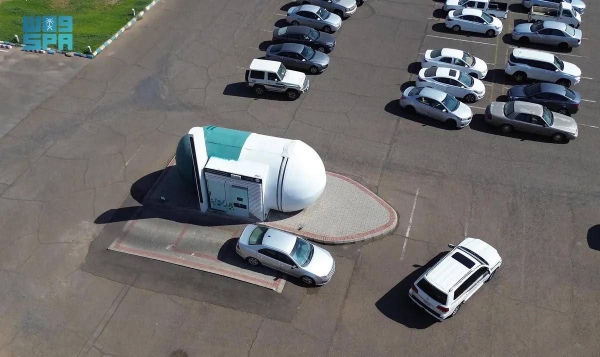
Imah Dumagay is one of the most recognized comics in Dubai’s comedy scene
Her routines shed light on the experiences of overseas Filipinos in the Middle East
MANILA: When Imah Dumagay takes the stage, it is not just comedy for her but also a mission, where the spotlight and microphone become her weapons to tackle stereotypes — one punchline at a time.
Dumagay began her journey in the UAE in 2008. After 10 years of working in the corporate world, a sudden change of heart made her take acting classes, which soon flipped her career upside down and turned her into the first Filipina stand-up comedian in the Gulf region.
Since 2018, Dumagay has performed nearly every night and now has over 70,000 followers on TikTok.
“Hello everyone, I’m from the Philippines, but I’m not taking any orders tonight,” she informs the audience onstage as she takes the microphone and adds to their roaring laughs: “But if you are looking for a maid, I am available on Saturday.”
The founder of Comedy Kix, a popular comedy club that runs shows in Dubai, Dumagay is one of the most recognized comics in the local stand-up scene who, with her rapid-fire punchlines and playful sets, sheds light on the lives and struggles of her fellow countrymen and women.
Nearly 2 million overseas Filipino workers live in Gulf countries, mainly employed in Saudi Arabia and the UAE. While many of them are professionals, more than half work as domestic helpers or in services and sales.
“Sometimes, when I am about to go on stage, people will mistake me for a waitress. When I was first mistaken for that, I was shocked in the beginning,” Dumagay told Arab News.
She has adapted that experience into one of the most popular opening liners for her set.
“That’s actually my opening joke now,” she said. “One British lady asked me: ‘I’d like to order a cup of tea.’ And I’m like: ‘Me too.’”
The stereotypes have been working to her advantage and have helped her get the audience’s attention.
“You rarely see a Filipino in this art form. So, to see (me), they’ll be like: ‘Let’s see what she has got to say,’” she said.
“When people ask me: ‘Do you get angry when you’re mistaken?’ I say ‘no’ because these stereotypes are not harmful to me. There’s nothing wrong with being a waitress, a maid or a saleslady. Everybody’s working hard.”
That hard work, which often does not meet fair treatment, is what fuels Dumagay’s advocacy for respect for overseas Filipino workers.
“Domestic helpers, they’re not as lucky as those of us working in entertainment or in the office. Some of my relatives work here as part-time cleaners or nannies. So, I also include it in my work to make sure that people know how to treat these Filipinos who work for them,” she said.
“If you’re brown or if you’re Filipina, you must be either working at sales, or you’re a waitress, and all these things, right? There’s nothing wrong with that. But the problem is how people treat you. When I go to a show, people don’t notice me, don’t talk to me, don’t really give me attention. And when they hear that I am the headliner of the night, this changes. Suddenly they’re nice to me.”
Dumagay’s English routines on her experiences and observations — including being on the receiving end of stereotypes — have been drawing international crowds and selling out shows at The Theatre, a center of live performances at the Mall of the Emirates.
People often approach her after the gig and say they had no idea there were Filipino comedians, which is when she makes it clear to them that many of the saleswomen they might have mistreated at shopping centers were better educated than them but did not have as good opportunities.
“Unfortunately, when you are in a lower position, you are treated differently,” she said.
“As a stand-up comic, I try to make sure that the subtexts of my jokes are: ‘Hey, you should not treat people based on their work or based on stereotypes because stereotyping people is just very lazy.’”












